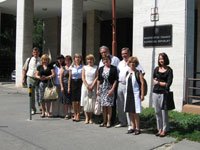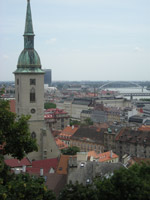A study tour to the Republic of Slovakia
02 August 2009

A study tour of a group of representatives of the Ukrainian Ministry of Finance, Verkhovna Rada Committee on Budget, and local finance departments to the Republic of Slovakia took place on 26 July through 2 August 2009.
The trip was intended to study the European experience of fiscal decentralization, which is to be used in further elaboration of a new system of financing the local self-government in Ukraine. Introduction of such a system would make it possible to raise the level of financial sufficiency of local governments and promote transparency of the budget process.
The study tour was arranged as part of the Experience of Fiscal Decentralization in Slovakia for Ukraine project implemented by IBSER with financial support of the International Renaissance Foundation and in collaboration with the Slovak partners from the M.E.S.A. 10 Slovak Center for Economic and Social Analysis.
The study tour itinerary included the cities of Piestany, Trnava, Trencin, and Bratislava, where the participants met with members of the Government of Slovakia, members of the Budget Committee of the Slovakian Parliament, the leadership of the Slovakia’s Ministry of Finance, representatives of mayor’s offices in the said cities, leaders of the M.E.S.A. 10 Slovak Center for Economic and Social Analysis, and familiarized themselves with the experience of the implemented reforms aimed at fiscal decentralization in Slovakia.
The meetings, roundtables, seminars, and discussions included in the study tour agenda allowed the participants ample opportunity to learn about Slovakia’s economic development and convergence programs, special characteristics of its political system and administrative-territorial system. Special focus was made on the role of local governments in the regional development, as well as the issue of local government reform in the context of European integration.
The Slovak experts have shared with the Ukrainian counterparts their experience of implementing fiscal reforms, the strengths and weaknesses of a system of local taxes and fees introduced by the Government of Slovakia, in particular, the real estate tax as one of the revenue sources for local budgets.
In the course of their meetings, the Ukrainian participants had an opportunity to learn from local examples about the key aspects of regional governance and development in Slovakia, as well as about the successful experience of interaction between the local, regional, and central government authorities in the fiscal matters.
 There was a very useful and interesting meeting in Bratislava with the member of the Parliamentary Budget Committee, Minister of Finance and Prime Minister for Economy in the previous Government of Slovakia, Ivan Miklos, as well as with the State Secretary of the Ministry of Finance of the Slovak Republic, Frantisek Palko. The meeting focused on the relevant issues of political and economic reforms in Slovakia implemented in the context of European integration, as well as on special approaches to financing the regional development and the system of intergovernmental finance relations.
There was a very useful and interesting meeting in Bratislava with the member of the Parliamentary Budget Committee, Minister of Finance and Prime Minister for Economy in the previous Government of Slovakia, Ivan Miklos, as well as with the State Secretary of the Ministry of Finance of the Slovak Republic, Frantisek Palko. The meeting focused on the relevant issues of political and economic reforms in Slovakia implemented in the context of European integration, as well as on special approaches to financing the regional development and the system of intergovernmental finance relations.
The study tour culminated in a roundtable to sum up the findings, discuss the opportunities for using the Slovakia experience in Ukraine, as well as for the study tour participants to develop the recommendations for the Action Plan towards further implementation of the experience of Slovakia’s fiscal decentralization reform in Ukraine.
In the course of the presentations made and meetings held, the participants could share experiences with their counterparts, discuss the problem issues, and receive answers from experts, learn from best foreign practices of fiscal decentralization, and share their thoughts with regard to the opportunities and methods of drawing on the experience of Slovakia in implementing reforms in Ukraine.
This is not the first of the IBSER activities under this Project, whose long-term objective is assuring financial autonomy and transparency of the budget process at the local level in Ukraine.
As part of Project implementation and seeking to study the experience of fiscal decentralization, the IBSER experts, working with their Slovak counterparts, conducted an international conference and a series of subject-matter seminars both in Kyiv and in the pilot regions. The next phase of Project implementation would involve a final conference to summarize the results of Project’s previous phases, which is scheduled to be held in Kyiv.
The trip was intended to study the European experience of fiscal decentralization, which is to be used in further elaboration of a new system of financing the local self-government in Ukraine. Introduction of such a system would make it possible to raise the level of financial sufficiency of local governments and promote transparency of the budget process.
The study tour was arranged as part of the Experience of Fiscal Decentralization in Slovakia for Ukraine project implemented by IBSER with financial support of the International Renaissance Foundation and in collaboration with the Slovak partners from the M.E.S.A. 10 Slovak Center for Economic and Social Analysis.
The study tour itinerary included the cities of Piestany, Trnava, Trencin, and Bratislava, where the participants met with members of the Government of Slovakia, members of the Budget Committee of the Slovakian Parliament, the leadership of the Slovakia’s Ministry of Finance, representatives of mayor’s offices in the said cities, leaders of the M.E.S.A. 10 Slovak Center for Economic and Social Analysis, and familiarized themselves with the experience of the implemented reforms aimed at fiscal decentralization in Slovakia.
The meetings, roundtables, seminars, and discussions included in the study tour agenda allowed the participants ample opportunity to learn about Slovakia’s economic development and convergence programs, special characteristics of its political system and administrative-territorial system. Special focus was made on the role of local governments in the regional development, as well as the issue of local government reform in the context of European integration.
The Slovak experts have shared with the Ukrainian counterparts their experience of implementing fiscal reforms, the strengths and weaknesses of a system of local taxes and fees introduced by the Government of Slovakia, in particular, the real estate tax as one of the revenue sources for local budgets.
In the course of their meetings, the Ukrainian participants had an opportunity to learn from local examples about the key aspects of regional governance and development in Slovakia, as well as about the successful experience of interaction between the local, regional, and central government authorities in the fiscal matters.
 There was a very useful and interesting meeting in Bratislava with the member of the Parliamentary Budget Committee, Minister of Finance and Prime Minister for Economy in the previous Government of Slovakia, Ivan Miklos, as well as with the State Secretary of the Ministry of Finance of the Slovak Republic, Frantisek Palko. The meeting focused on the relevant issues of political and economic reforms in Slovakia implemented in the context of European integration, as well as on special approaches to financing the regional development and the system of intergovernmental finance relations.
There was a very useful and interesting meeting in Bratislava with the member of the Parliamentary Budget Committee, Minister of Finance and Prime Minister for Economy in the previous Government of Slovakia, Ivan Miklos, as well as with the State Secretary of the Ministry of Finance of the Slovak Republic, Frantisek Palko. The meeting focused on the relevant issues of political and economic reforms in Slovakia implemented in the context of European integration, as well as on special approaches to financing the regional development and the system of intergovernmental finance relations. The study tour culminated in a roundtable to sum up the findings, discuss the opportunities for using the Slovakia experience in Ukraine, as well as for the study tour participants to develop the recommendations for the Action Plan towards further implementation of the experience of Slovakia’s fiscal decentralization reform in Ukraine.
In the course of the presentations made and meetings held, the participants could share experiences with their counterparts, discuss the problem issues, and receive answers from experts, learn from best foreign practices of fiscal decentralization, and share their thoughts with regard to the opportunities and methods of drawing on the experience of Slovakia in implementing reforms in Ukraine.
This is not the first of the IBSER activities under this Project, whose long-term objective is assuring financial autonomy and transparency of the budget process at the local level in Ukraine.
As part of Project implementation and seeking to study the experience of fiscal decentralization, the IBSER experts, working with their Slovak counterparts, conducted an international conference and a series of subject-matter seminars both in Kyiv and in the pilot regions. The next phase of Project implementation would involve a final conference to summarize the results of Project’s previous phases, which is scheduled to be held in Kyiv.

 Glyanec
Glyanec